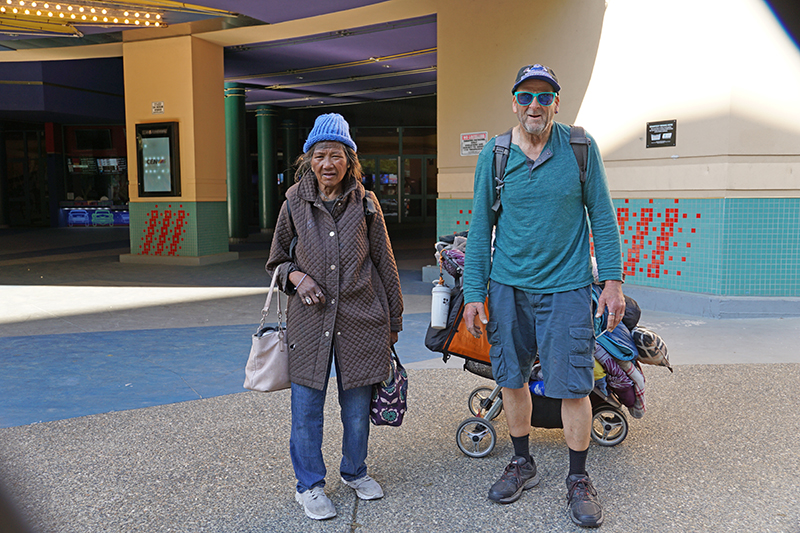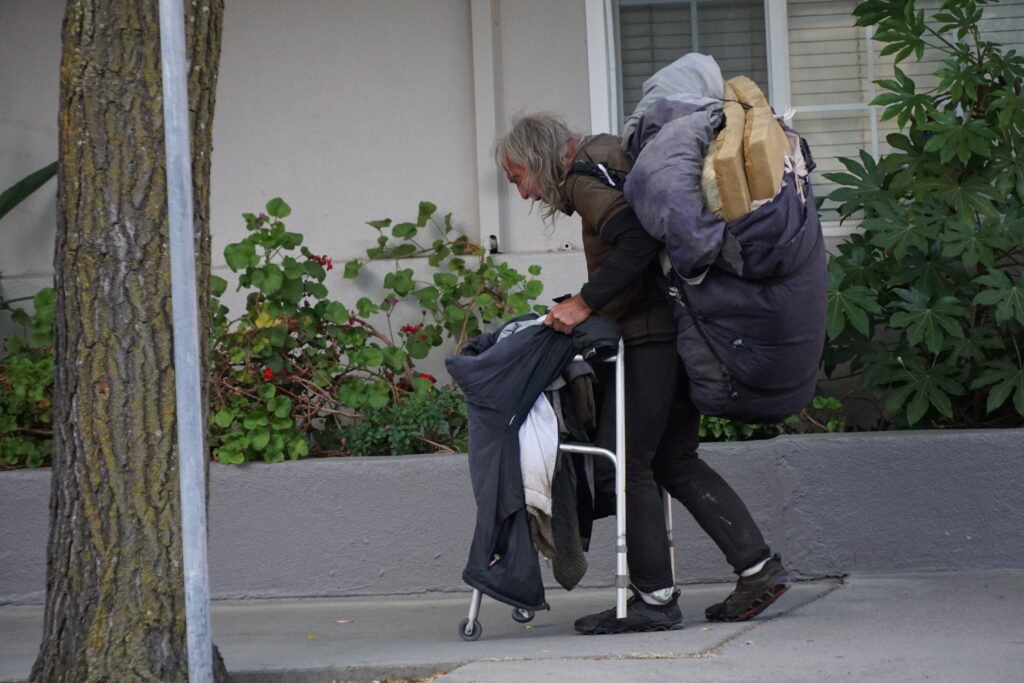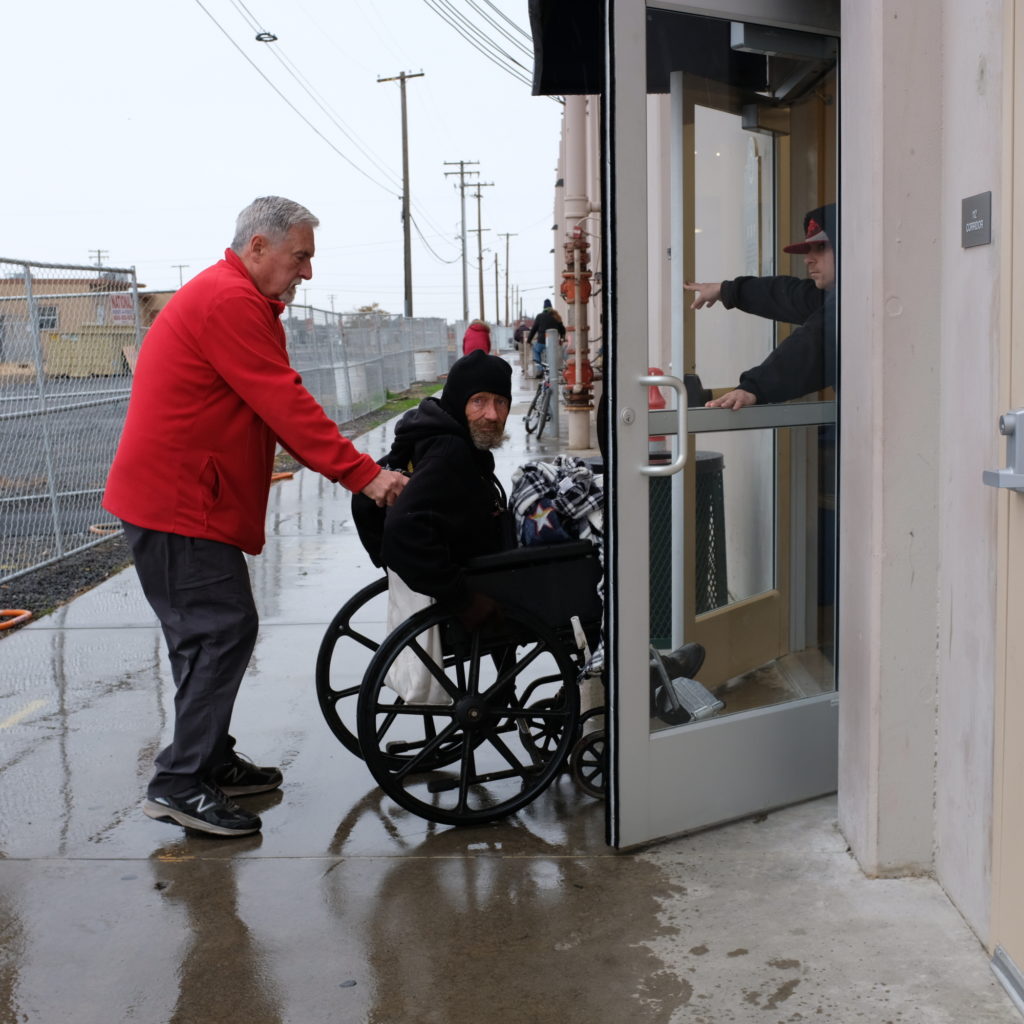Back in early June, I walked by an elderly gentleman a few times on McHenry Avenue in Modesto who had hidden himself among some thick Oleander bushes bordering a parking lot. The fellow was raggedly dressed and looked all but resigned to whatever fate had in store for him. He was surrounded by a few possessions and sat on a rickety wooden chair. When I asked if he needed anything, he didn’t respond — he just kept staring out at the passing traffic as it sped by.
A few days later only the chair remained. But where had the fellow gone? What had brought him to that makeshift place of shelter, and what had prompted — or forced him — to leave? Hunger? A medical emergency? He had simply vanished, melting into a world that seemed largely indifferent to his suffering.
Like so many other of our neighbors I’ve encountered out on the streets over the past decade, this individual and his plight left a lasting impression on me. I had to look up the source for the quotation, but apparently Puritan John Bradford is often attributed with saying, “There but for the grace of God go I…” — that brief poem-like phrase of humility and empathy for the sorrows and troubles of those who endure circumstances far less fortunate than our own.
In a selfless decade and a half of volunteer service to those in our community forced to live on our streets and parks and along our waterways, Frank Ploof has encountered and materially assisted many, many individuals like the fellow I saw those few times in late spring. His dedication to those of our neighbors in grave distress or need has essentially become the guiding mission of his retirement years, following a distinguished career at Lawrence Livermore National Laboratory.
Over the years, Frank has tirelessly set about his task of finding and then lending a helping hand to the unhoused, as well as being a strong, loyal advocate for the voiceless and the underserved.

During 2023, along with other members of the Modesto Citizens Action Group (MoCag), he fought for and watched in frustration and dismay as a safe ground for the homeless proposal was voted down by a 4-3 vote by the Modesto City Council.
But Frank, who’ll be 78 years old himself in April, is nothing if not resilient and has recently been working on a proposal that would shift the focus from “safe ground” and draw attention to the alarming increase of older adults among the unhoused.
“We’re shifting gears, changing the vocabulary,” he said in a recent interview.
“We’re trying not to use the word homeless.”
Since the safe ground proposal failed to garner the necessary support from the Modesto City Council fourteen months ago, Frank is fully behind an approach tentatively called Safe Haven for Vulnerable Seniors.
The goal of this proposal is to “get seniors into a safe place where they can get the medical treatment that most of them need in one way or another.” While there are other services focusing on seniors in Stanislaus County, this program would be different in that “this would be a low-end safe haven for seniors where the primary mission is safety and providing health care services.”

As Frank can attest to from his own field experience, the unhoused population is aging.
The California Statewide Study of People Experiencing Homelessness (CASPEH) found that, “the median age of all homeless adults in California was 47,” while the study also found that “older adults experiencing homelessness were in poor health, with a high prevalence of chronic diseases and functional impairments.”
According to the 2024 Point in Time Count, there are currently 2,052 people in Stanislaus County who are unhoused, either living in a shelter or on the streets, About 21% of those are older adults, aged 55 and above. With the high cost of housing forcing more and more older adults to the margins, the number of unhoused older adults has increased in recent years, Frank noted.
The CASPEH study found that “forty-one percent of older homeless had their first experience of homelessness after age 50” – at a point in their lives when they are highly vulnerable in any number of ways. This is the population that Frank believes could be best served through focused services.
In the program he and others are still fine-tuning, “vulnerable seniors would have small temporary-transitional housing where they can develop a plan to move on to permanent supportive housing, dependent upon the availability.”
“Many seniors need medical care,” Frank explained, “so we are exploring the possibility of the site operator being an organization that has a ‘Program of All-Inclusive Care for the Elderly’ (PACE) service such as Golden Valley and Wellbe Health.”

When asked why we continually fall short of our goals to fully assist unhoused individuals in our community when so many people are working hard at all levels on the issue, Frank answered slowly, carefully choosing each word:
“It’s a multifaceted longtime human condition problem and in our contemporary world it comes down to politics and dollars, where the dollars are controlled by the politics, from the federal to the local level. Cities are not funded to deal with the issue in any meaningful capacity — they are not funded to provide housing. Through state funding, it’s the county’s job to take care of health issues, particularly mental health. For example, the County receives MediCal funding, which is a federal pass through.
“The intent of the power system is to make the unhoused among us invisible – it’s a lesser form of cruelty to make them invisible than it is to lock them up. So, when they chase them out of the parks, the unhoused go somewhere else where they’re not as visible. It’s very hard, especially now when you have the Park Rangers who can chase them out of any park, and then there’s the police and the sheriffs hustling up anything that looks like a camp and telling them to move on. Also, some neighborhoods are better organized than others with their NIMBY -ism efforts, and that’s been discouraging.
“I hate to use a worn-out phrase – but it’s doing the right thing. The right thing in the context of humanity is to make sure that the least of us are treated well. Being civil is actually hard work. I can see where there’s a tendency to be authoritative – you don’t have to worry about negotiating anything with anybody. But you have to move away from that if you want to live in a civil society, because it’s about negotiation. None of us can have everything. To be human in a civilized sense means that everyone deserves respect.”
Winter’s cold, stormy weather is already upon us, and Frank expressed concern that there were possibly not enough warming centers throughout the county, particularly fearing that the closure of the Modesto Central Library for renovations will impact the unhoused as they seek respite from the elements. He urged the community to be on the lookout for their neighbors on the streets and in the parks and help them whenever and wherever they can — to do “the right thing,” as Frank implores us to do, so that all of us can be treated with the respect and dignity we deserve.

We were lucky to have Frank on the Salida MAC for a few years in the past.
So well written, about a vulnerable group in our Community! Thank you, Tom!
This is a great community and I appreciate every donation I have ever got been homeless for years I am currently at salvation army county side and I really appreciate everything that people did for us at beardbrook Park .!!! thanks and Happy New year
I believe many more would seek and trust help more if there wasn’t such an extreme adjustment from how they have been living for years to accepting assistance from a program. I know a lady over 50 years old who had a traumatic experience with a mental health treatment but is REQUIRED to receive assistance from BHRS in order to get housing. Obviously she’s going to be apprehensive towards receiving any mental health assistance. I personally can’t blame her. However if she doesn’t she can’t get housing. This doesn’t seem fair. A woman should not be on the street ever. She has been attacked and had her face broke in 4 places and almost attacked a few other times for unknown reasons.
This is not acceptable.
Agree Frank and many others have worked hard to gain ground for the homeless. Biggest problem I see is the ones with the most power are not willing to take on the responsibility. LET SOMEONE ELSE DO IT. That appears to be only the very rich or some that want to enrich themselves with the problem. Down at this level we aren’t strong enough to make a big difference especially when you have a City Gov. 4 to3 says no. If even the lowest segment of officials, City Council in this case say no, that leaves the rich. Oh good all we need is a rich Elon Musk to take an interest. Sarcasm, sorry. Personally I would like to see a variation of the denied Safe Camping proposal to change to a guaranteed slices of ground in reachable areas, that the City and County guarantee not liable to sweeps for people to sleep on. Not a permanent place during daytime to stay. Any and all restrictions will be the homeless themselves. At night the Police/Sheriff will patrol closer to regulate the crime and attacks these people suffer all the time. The word closer does not mean to walk among them, homeless, for no reason. As it is the PEOPLE are harassed from sleeping ANYWHERE. Standing only is allowed! Such a little to ask!